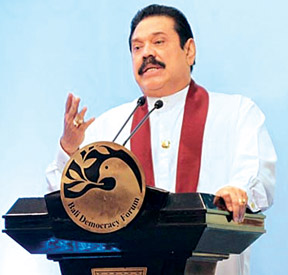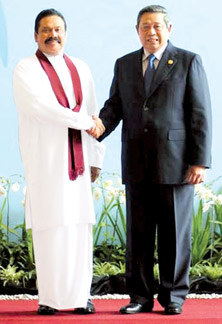|
President tells Bali Democracy Forum:
Meaningful democracy requires close interaction between Govt,
community
|

President Mahinda Rajapaksa addresses the Bali Democracy Forum
IV in Bali, Indonesia. Pix: Sudath Silva |
If democracy is to be meaningful and command the people’s respect, it
must have a direct impact on their everyday lives. This necessarily
calls for the closest possible interaction between the government and
the community. The mechanisms of government must have effective
application at the grassroots level, in order to address issues and to
provide relief, President Mahinda Rajapaksa told the Bali Democracy
Forum IV in Bali, Indonesia last week.
It has always been important for us to ensure that the forms and
institutions of democracy, far from being an ideal remote from the
people, be part and parcel of their experience, the President said.
It is worthy of note that Sri Lanka is the first country in Asia to
have accorded women the right to vote, and they secured this right just
two years after the en-franchise-ment of women in the United Kingdom.
The diversity of Sri Lanka’s experience of constitutional and
electoral systems is probably unique in the annals of political history.
Our country has been governed under both the Westminster style Cabinet
system and the Executive Presidential system which was introduced into
our public law in 1978, he said at the inaugural session of the Forum.
We have had experience of the first past the post electoral system,
which continues to operate in many of the countries participating in
this Forum, as well as a version of proportional representation which
applies in Sri Lanka today. We are now contemplating a hybrid system,
combining elements of both these approaches, as the solution best suited
to the needs and circumstances of our country. The sum total of these
comparative approaches has imparted to us a maturity of outlook and a
breadth of vision which have greatly enriched our political culture.
It is a matter of deep pride to us that Sri Lanka is one of the
oldest practising democracies, not only in the Asian continent, but in
the world at large. Our people have enjoyed universal adult franchise
since 1931, and they have been accustomed, without interruption, to
electing and changing governments in an entirely orderly and peaceful
manner for eight decades. Even under the LTTE threat we were continuing
elections, President Rajapaksa said.
The full text of the President’s speech:
|

President Mahinda Rajapaksa being greeted by Indonesian
President Dr. Susilo Bambang Yudhoyono. |
“It is my pleasure to express warm appreciation of the invitation
extended to me by Dr. Susilo Bambang Yudhoyono, President of the
Republic of Indonesia, to participate in the Fourth Bali Democracy
Forum. I would like to thank the Government of Indonesia for the
excellent and very thoughtful arrangements which have been made to host
this important forum in the enchanting surroundings of Bali.
In a world where every aspect of life is subject today to basic
transformation, one of the most significant strands that run through the
value systems of all the countries represented here, is our strong
commitment to democracy, not only as a system of governance, but as a
way of life. It is, however, a constant challenge to ensure that our
practice of democracy remains at all times responsive to the priorities
and aspirations of our people, so that their confidence in the system is
continually strengthened.
It is for this reason that I regard the theme which has been chosen
for this symposium ‘Enhancing Democratic Participation in a Changing
World: Responding to Democratic Voices’, as entirely appropriate.
In view of the vast and varied range of experiences which
distinguished delegates bring to bear on this Forum to enrich its
proceedings, I thought that the appropriate contribution I could make on
this occasion is to comment on some features of democracy which have
been developed and applied in my country in a special way.
It is a matter of deep pride to us that Sri Lanka is one of the
oldest practising democracies, not only in the Asian continent, but in
the world at large. Our people have enjoyed universal adult franchise
since 1931, and they have been accustomed, without interruption, to
electing and changing governments in an entirely orderly and peaceful
manner for eight decades. Even under the LTTE threat we continued with
elections.
It is worthy of note that Sri Lanka is the first country in Asia to
have accorded women the right to vote, and they secured this right just
two years after the en-franchise-ment of women in the United Kingdom.
Political history
The diversity of Sri Lanka’s experience of constitutional and
electoral systems is probably unique in the annals of political history.
Our country has been governed under both the Westminster style Cabinet
system and the Executive Presidential system which was introduced into
our public law in 1978.
We have had experience of the first past the post electoral system,
which continues to operate in many of the countries participating in
this Forum, as well as a version of proportional representation which
applies in Sri Lanka today.
We are now contemplating a hybrid system, combining elements of both
these approaches, as the solution best suited to the needs and
circumstances of our country. The sum total of these comparative
approaches has imparted to us a maturity of outlook and a breadth of
vision which have greatly enriched our political culture.
It has always been important to us to ensure that the forms and
institutions of democracy, far from being an ideal remote from the
people, should be part and parcel of their experience.
If democracy is to be meaningful and command their respect, it must
have a direct impact on their everyday lives. This necessarily calls for
the closest possible interaction between government and the community.
The mechanisms of government must have effective application at the
grassroots level, in order to address issues and to provide relief.
This is an area in which the political traditions of Sri Lanka have
special vitality. In our home-grown structures, which flourished before
the advent of Western colonial powers, pride of place was given to the
gamsabhas . These functioned as vigorous local government bodies,
consisting of leaders of the local communities, and dealt with issues in
a practical way to arrive at solutions before problems assumed serious
proportions.
There was a court official who conveyed hardships and injustices
faced by the people to the ruler to which ample reference is made in our
literary and sociological texts, this fore-shadows the role of the
Ombudsman in Scandinavian countries, the Parliamentary Commissioner for
Administration in the United Kingdom and the Lokpal in India. Its
essence was amicable settlement of disputes in the village through
mediation and conciliation, rather than resorting to litigation, with
its accompanying bitterness and hostility.
Central focus
The village temple, as the central focus not only of spiritual faith,
but of the educational process and cultural pursuits, served as the
pivot of social organisation.
Our ethical beliefs relating to governance derived primarily from the
dasa raja dharma, or the fundamental moral norms of governance, laid
down by Gautama Buddha in the Dhammapada .
This spirit of amity and togetherness, and the tradition of sharing
both joy and sorrow among neighbours, families and the community formed
the inspiration of our indigenous social structures and deeply
influenced our practice of governance over the centuries.
The party which I have the honour to lead, the Sri Lanka Freedom
Party, seeks to capture the substance of this people-oriented and
people-serving tradition by insisting that its basic attitudes must stem
from the instincts of the people and the values rooted in their culture.
It is only then that governments give expression to the ideas and
sentiments of the nation, “responding to democratic voices”, in the apt
words of the formulation of the theme of the Bali Forum.
The bedrock of our approach to governance is the pancha maha balavega
– the five pillars of society symbolised by the priest, the teacher, the
physician, the farmer and the worker. They constitute, collectively, the
nation’s lifeblood. In our view, relevance and acceptability of
government postures and, indeed, the principal directions of government
policy, demand that faith be always kept with the identity and mindset
of the people.
In order to achieve this, it is our firm belief that the first and
essential task of a democratic government is to make the fullest
possible provision for access to opportunity on a just and equitable
basis. We have seen to it that social mobility is not confined to the
privileged in the towns and cities of the country, but penetrates deep
into the rural sector.
Trade relations
It is also worth noting that Sri Lanka’s economic and trade relations
with distant lands are vividly portrayed in literature, even in times of
antiquity.
Examples are provided by the writings of Ptolemy and Pliny the Elder.
Our country’s ambassadors were received with honour in ancient Rome.
What emerges from this historical evidence is a vibrant economy, a
contented society and a stable system of governance. We also had a
system of governance and administration where tax collection and revenue
administration were at an advanced state.
Education is the key to social advancement. A contribution of unique
value which my country has been able to make to social development in
the field of education, is the innovative scheme in terms of which
students, apart from enjoying free education from kindergarten to
university, are assured of the benefit of assistance from the State with
regard to provision of all their needs, including board and lodging,
books and incidental expenses, throughout the period of their
educational career.
This is undoubtedly the basis of the social transformation which has
taken place in recent times in our country, resulting in levels of
achievement not only in respect of education in the conventional sense,
but also computer literacy and skills development in contemporary
fields, without parallel in the region.
I hope these reflections on Sri Lanka’s experience will be of some
interest to the distinguished delegates gathered here in Bali for this
timely and valuable Forum. I wish your deliberations every success.
May the Noble Triple Gem Bless you all !” |

